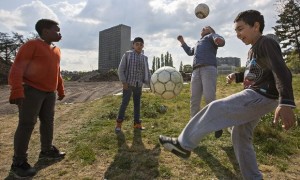The Belgian national team represents more than just themselves. These footballers also represent their communities and heritage and are critical in shaping a new Belgian identity.
Like the rest of Europe, Belgium has been the subject of waves of immigration since the late 1960s. Today, around 20 percent of the population is foreign-born. But soccer has always been unusually present as a vehicle for Belgium’s attempts to adapt to a new kind of society.
Not long ago, the great Belgian footballers only came from elite, well-off neighborhoods. Recently, the federation has worked to welcome immigrants into the system while also expanding their reach and targeting kids in rougher, empovrished communities.
Says Kismet Eris, the owner of a own football academy in Liège: “With the national youth teams, you can see that you’ve got a lot of children of immigrants, or former refugees, representing Belgium. A few years ago it was not like that. Now it is more open… they are also accepted as Belgian people, because they see some of their own playing for the national team.”
The Belgian FA’s new recruitment strategy is fully in place in Droixhe. Droixhe, a desperately poor neighborhood on the fringes of Liege, has been known for its large immigrant population and crime ridden area.

Young Belgian boys kicking the football around in the streets of Droixhe. Source: https://i.guim.co.uk/img/static/sys-images/Football/Pix/pictures/2014/6/6/1402088498448/Belgian-youngsters-010.jpg?w=620&q=55&auto=format&usm=12&fit=max&s=d0ed657e96009b277e7ed8d3d48f095f
But now, three of Droixhe’s native sons, Christian Benteke, Axel Witsel, and Zakaria Bakkali, will be heavily featured during 2016 EUROs and are poster children for the Belgium footballing revolution.
The team is full of immigrant heritage. Kompany and Everton striker Romelu Lukaku are of Congolese heritage. Fellaini, Bakkali, and Nacer Chadli are from Morocco. The father of Moussa Dembele is from Mali. The family of Divock Origi is from Kenya. More than half of the team is multilingual. One thing links all of these players: they play for Belgium.
Belgium’s “golden generation” reminds many pundits of France’s famous World Cup champion “rainbow team” of 1998 — as a beacon of diversity, hope, and multicultural possibility for the country beyond beyond just the football pitch.
By Nick Salzman, Sam Skinner, and Will Feldman
Home Country History Team History Rise of the Red Devils Euro 2016 Expectations Belgian Players to Watch at EURO 2016 A New National Identity Symbol for Unity
How to Cite this Article: “A New National Identity” Written by Nick Salzman, Will Feldman, and Sam Skinner (2016), European Cup 2016 Guide, Soccer Politics Blog, Duke University, http://sites.duke.edu/wcwp/tournament-guides/european-cup-2016-guide/belgium/a-new-national-identity/(accessed on (date)).
